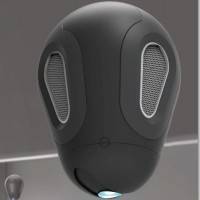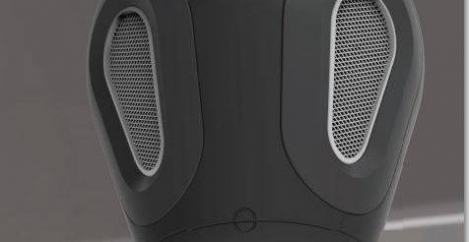June 8, 2015
FIRA announces winners of competition to design the workplace of the future
 The judges of a design competition which challenged undergraduates to share their ideas for a workplace of the future have announced the three winners. The ‘FUTURE@WORK’ competition was run by the Furniture Industry Research Association (FIRA) and sponsored by contract furniture firm Morgan. Winners of first, second and third prize were chosen from four shortlisted entries. The designs were subject to a public vote which took place at Morgan’s showroom throughout Clerkenwell Design Week and on FIRA’s website. The winner of the first prize and the public vote is Familiar Systems, a piece of technology which aims to replace the computer screen. The device was designed by Jack Darby and Andy Lyell, is based on drone technology and incorporates a projector and a pivoted support known as a gimble which allows the user to work in a variety of locations and configurations.
The judges of a design competition which challenged undergraduates to share their ideas for a workplace of the future have announced the three winners. The ‘FUTURE@WORK’ competition was run by the Furniture Industry Research Association (FIRA) and sponsored by contract furniture firm Morgan. Winners of first, second and third prize were chosen from four shortlisted entries. The designs were subject to a public vote which took place at Morgan’s showroom throughout Clerkenwell Design Week and on FIRA’s website. The winner of the first prize and the public vote is Familiar Systems, a piece of technology which aims to replace the computer screen. The device was designed by Jack Darby and Andy Lyell, is based on drone technology and incorporates a projector and a pivoted support known as a gimble which allows the user to work in a variety of locations and configurations.
The Orbis Desk is the winner of the second prize, designed by Mark Heyster, his design aims to take into account the unique needs of creative professionals by offering an adjustable workspace, including the ability to tilt the desk at different angles.
The third prize goes to the Drop Desk, a sit/stand desk designed by Jonathan Thompson.
The winner of first prize will be receiving £3,000; second prize £1,000 and third prize £500. Another £500 is awarded to the winner of the public vote.
Dr Peter Beele, Council Member for the Furniture Industry Research Association, said: We were delighted with success of the competition and final deliberations identified a clear winner. The judges envisaged that, although futuristic, it was not beyond the realms of possibility that the Familiar Systems, or a similar concept, would find its way into a future workspace. The concept addresses many of the criteria that impact on work environments, in particular the ability to interact with both people and technology in a fully flexible manner. It also offers a solution to some of the more costly elements within a workspace, such as the need for complicated hard wiring infrastructures which often need to be updated to reflect changing uses or work patterns and the option for accommodating a greater number of individuals within smaller spaces. All of the finalists demonstrated that they had fully researched elements of the brief and the calibre of submissions in terms of presentation and layout was excellent. They should all consider themselves winners.”
The brief outlined that design concepts should fall into one of three categories; personal space, small group space or novel product design. Applicants were urged to consider sustainability in its broadest sense, the impact of technology and social criteria.
The competition was open to all undergraduate students studying on furniture, design or architecture related courses in a UK university.
First place
Familiar Systems
Designed by Jack Darby and Andy Lyell. Click here to view the entry as a pdf.
Second place
Orbis Desk
Designed by Mark Heyster. Click here to view the entry as a pdf.
Third place
Drop Desk
Designed by Jonathan Thompson. Click here to view the entry as a pdf.















